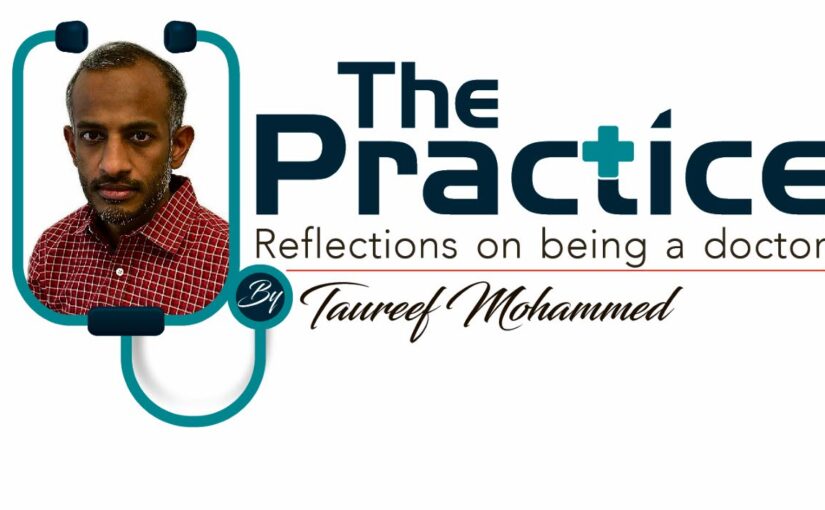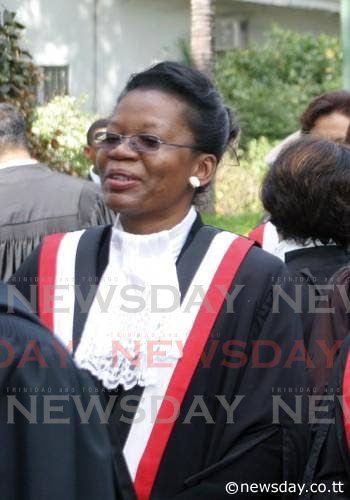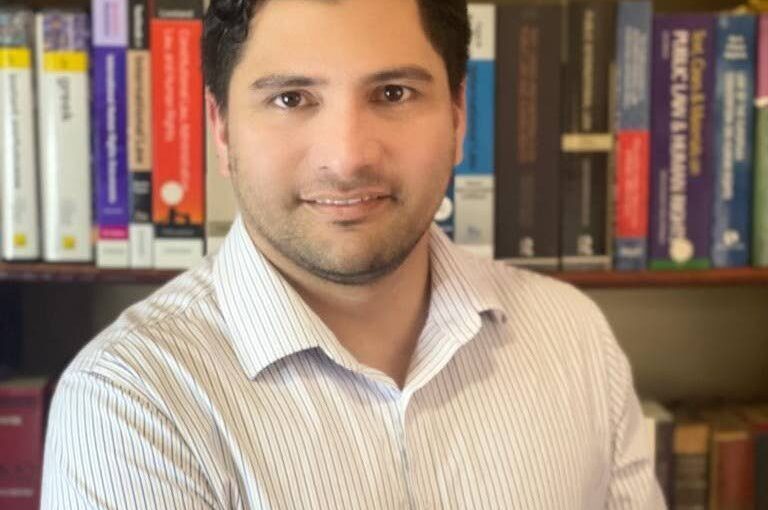A HIGH COURT judge has dismissed a doctor's judicial review claim against the Medical Board’s (MBTT) policy for specialist registration. Justice...
Vous n'êtes pas connecté
- English
- Français
- عربي
- Español
- Deutsch
- Português
- русский язык
- Català
- Italiano
- Nederlands, Vlaams
- Norsk
- فارسی
- বাংলা
- اردو
- Azərbaycan dili
- Bahasa Indonesia
- Հայերեն
- Ελληνικά
- Bosanski jezik
- українська мова
- Íslenska
- Türkmen, Түркмен
- Türkçe
- Shqip
- Eesti keel
- magyar
- Қазақ тілі
- Kalaallisut ; kalaallit oqaasii
- Lietuvių kalba
- Latviešu valoda
- македонски јазик
- Монгол
- Bahasa Melayu ; بهاس ملايو
- ဗမာစာ
- Slovenščina
- тоҷикӣ ; toğikī ; تاجیکی
- ไทย
- O'zbek ; Ўзбек ; أۇزبېك
- Tiếng Việt
- ភាសាខ្មែរ
- རྫོང་ཁ
- Soomaaliga ; af Soomaali
Rubriques :
 Maroc - NEWSDAY.CO.TT - A la Une - Hier 07:40
Maroc - NEWSDAY.CO.TT - A la Une - Hier 07:40
The disassembling of the human
Taureef Mohammed THE PATIENT lying in the bed was a living corpse: the heart tracing looked perfect, the blood pressure looked adequate, oxygen saturation was over 90 per cent, but, still, the patient looked dead. It seemed like life had been sucked out of him. He looked frail. When he opened his eyes he stared blankly. “He is dying. Who knows, maybe he is already dead,” my attending, who was seeing the patient for the first time, said. Dying/death was a diagnosis, it seemed, and everybody had missed it. For two weeks modern medicine – practised in a dazzling, multi-storey, academic hospital, built, it seemed, of glass and equipped with the latest of everything: every investigation, a click away; every specialist, a call away – had disassembled this human into component parts, so much so that the patient lying in the bed in the cardiac care unit did not appear to be a human, but a conglomerate of organs that was being kept alive by machines and medications controlled and doled out by multiple specialists – cardiologist, nephrologist, respirologist, gastroenterologist, neurologist, critical care specialist – who tweaked the components of the circuit while the family remained clueless that their loved one was no longer there, that the empty stares were indeed empty. How had this happen? I suspect that the disassembly had happened swiftly, and almost automatically. These days, humans are disassembled from the time they are wheeled into an emergency room, or walk into a doctor’s office. It is one of the successes – or a curse, depending on how you look at it – of modern medicine. Practitioners know the human body and its diseases down to the granular – no, even finer than that – molecular level. Do we actually see the human anymore? Have we all become pathologists looking through figurative microscopes, so fixated on pathology that we are incapable of seeing the human? Perhaps the above example was an extreme case. The idea, though, that the human has been disassembled is not extreme. In fact, it is the everyday reality for many people who are regular users and providers of healthcare. Take, for instance, a person with multiple medical conditions, say, hypertension, diabetes mellitus, chronic kidney disease, rheumatoid arthritis, asthma, heart failure. This person can easily be followed by five different specialists. Each specialist competently disassembles the patient every time the patient is seen. The problem is – whether it is because of time constraints, poor communication, incompetence, or just pure carelessness – the patient is not always reassembled. Off to the next specialist – in pieces. And so the patient hops around carrying bits and pieces of themselves from specialist to specialist – modern medicine. One may argue that it is the family doctor’s responsibility to reassemble the patient. This is a cop-out. In medicine, nobody has the luxury to treat only a heart, kidney, or lung, while turning a blind eye to the rest, the rest here referring to the human. Treating the organ and ignoring the human is not specialty medicine. It is, as one consultant – an old, grey-haired man about to retire – said, lazy medicine, lamenting how “doctors don’t think anymore.” And so, the disassembling of the human – once the subject matter of medicine – has led to the mass production of simple-minded doctors who are more comfortable to think in linear, algorithmic models, who prefer to look through microscopes than to look at nuanced, ambiguous human beings and figure them out. It is faster and, for sure, more lucrative. But to blame doctors for this outcome is disingenuous. We, just like patients, are pawns in a system that has advanced leaps and bounds. The human had been disassembled on day one of medical school, and remained disassembled, the components drifting further apart, as we shuttled through medical school, residency training, subspecialty, then sub-subspecialty training. How do we reassemble the human being in the doctor’s office, and at the bedside? The humanities – not science – hold the key. Many studies have looked at the effects of teaching the humanities in medical school. Among the benefits included improved self-awareness and confidence, better tolerance for ambiguity, higher levels of empathy, and lower rates of burnout. If people like Dr Premchand Ratan – who recited poetry on ward rounds and encouraged medical students to read novels so that they can imagine what it was like to live with a stroke – still existed there would be no need to revise medical curriculum. But they don’t make them like that anymore. They make machines instead – and why not? Taureef Mohammed is a physician from TT working in Canada E-mail: taureef_im@hotmail.com The post The disassembling of the human appeared first on Trinidad and Tobago Newsday.
Articles similaires
Medical Doctor
We seek a passionate, experienced doctor. We are a Functional medicine practice and require a candidate who is ready to employ a holistic approach to...
‘Personhood’ bill moves to Montana House floor
by Darrell Ehrlick, Daily Montanan February 10, 2025 Just a little more than 90 days ago, Montana voters soundly approved a state constitutional...
Bernie Sanders: The US’ Dangerous Move Toward Oligarchy, Authoritarianism And Kleptocracy – OpEd
Today, we find ourselves in a pivotal moment in American history and millions of Americans, by their actions or lack of action, will determine the...
The Most Dramatic Narrative Shift In Modern History – OpEd
The most dramatic narrative shift in this post-lockdown period has been the flip in the perceptions of government itself. For decades and even...
Chaos: There is something very, very wrong inside the Democratic Party
Let’s get this out of the way first: We are in the middle of a national emergency.As I type this, the convicted felon and America-attacking racist,...
Human rights body expands role to oppose colonial laws
FOUNDED in 2006, the Caribbean Centre for Human Rights (CCHR) initially focused on the death penalty and criminal justice reform. But over the years,...
PNM ministers criticise Deputy Chief Sec at sod-turning ceremony
DEPUTY THA Chief Secretary Dr Faith Brebnor received stinging criticism from several PNM ministers on January 29 after she accused the government of...
What About The Price Of Beef? – OpEd
By Mark Thornton In September 2023, we looked at the high price of beef and how big government has been bad for the American family budget. With...
Wisconsin Democrats seek to prohibit state and local cooperation with ICE
Wisconsin Democrats announced legislation Tuesday that would block state and local government officials from cooperating with federal deportation...
Les derniers communiqués
-
Aucun élément







